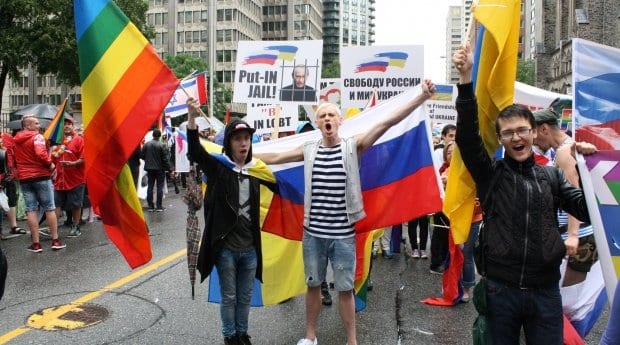A joint march between Russian and Ukrainian LGBT activists during the Pride parade in Toronto on June 28, 2015 was a historic first.
The activists from Kyiv Pride Canada, a Ukrainian-Canadian group, and Highway Liberty, which advocates for human rights across the former USSR, want to show that there is demand for peace and justice in Ukraine and support for LGBT rights in both countries. They’re also calling on Canadians to support LGBT communities in both countries.
Both countries have been in the spotlight for the past two years, since Russia passed a series of anti-gay laws aimed to silence the LGBT community and since the revolution in Ukraine ousted its Russian-backed dictator and sparked an undeclared Russian occupation in parts of Ukraine. Hostility between Russians and Ukrainians, and against both countries’ LGBT communities, has been running hot ever since.
Cooperation between the groups was not always easy, says Highway Liberty activist Konstantine Men, a Ukrainian-Canadian.
“The Russian community in Canada is divided in two camps. One is only pro-Putin, and whatever you say about his efforts in Ukraine, his efforts to forbid homosexuality in Russia, they 100 percent support,” Men says. “The other camp . . . know what it’s like to live here, and know what it’s like to live there. So we tended to approach people we know would be supportive.”
In addition to promoting tolerance and visibility of LGBT people in Russia and Ukraine, the groups are also working together to promote official Canadian involvement and support for those countries’ LGBT people over the long term.
One of the marchers, Justin Romanov, wants Canada to make it easier for LGBT people to escape violence in Russia by claiming refugee status here. At 18, Romanov came to Canada after years of routine violence and police brutality for being openly gay. He was kicked out of his high school in Moscow and sent to jail for his LGBT activism.
“There are many people who have no chance to come to Canada from Russia because they’re poor. My mom sold her apartment so I could get a visa. The visa barrier makes it impossible for poor people, which gay people are, because if you can’t go to school, you can’t get a job, you can’t get money,” he says.
Despite past promises from the Harper government that Canada would be open to LGBT refugees, Romanov says the government makes it difficult for LGBT Russians to even come to Canada — and refugee status can only be claimed on Canadian soil.
“If you say you want to be a refugee, of course they’ll say no. The immigration system is all about lying. You have to say you’re straight, you want to stay in Russia, you love Russia. If you say that, Canada will give you a visa,” he says.
Olena Semenova, an organizer of Kyiv Pride, travelled to Canada to liaise with activists during Pride. She notes that Canadian aid has helped Ukrainian groups set up a national hotline for LGBT people and will support an upcoming LGBT film festival — both examples of how Canadians can help support Ukrainian LGBT people.
“This is cultural exchange. We need not only money, but we need support,” she says. “It’s really important when people from other countries come to Ukraine and talk to the community. It makes us feel like we are not alone, because there are countries that already went this way and won. And we have hope that we also will reach this goal, and this way is not for nothing. And we will reach this goal. Not today, not tomorrow, not in three years, but we will reach this goal.”


 Why you can trust Xtra
Why you can trust Xtra


